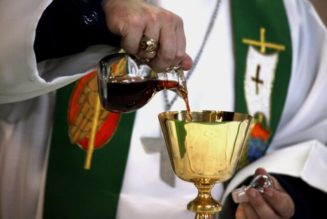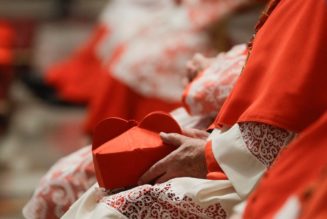By Dr. Jeff Mirus ( bio – articles – email ) | Nov 03, 2021
As the American bishops struggle through what ought to be a relatively simple discussion of “Eucharistic coherence”, some key principles of Eucharistic doctrine and discipline may once again remain unstated. The initial draft of the bishops’ document on this subject does not offer great hope. (See the draft text made available by The Pillar website, and our own summary of the salient point.)
As I mentioned in my commentary on Friday (Pope Francis urges Biden to receive Communion), the chief Eucharistic concern of serious Catholics today hinges on the common refusal of Church leaders, including Pope Francis, to forthrightly address the need to refuse communion to those claiming to be Catholic who are in public denial of Church teaching—really, in other words, in public denial of Christ. The courage to refuse the Eucharist in these situations is presumptively correct based on the Church’s constant past pastoral practice, the current requirements of Canon Law, and of course Cardinal Joseph Ratzinger’s deliberate clarifications to the US Bishops, when he was Prefect of the Congregation for the Doctrine of the Faith under Pope St. John Paul II.
Yet ever since politicians began to commit themselves openly and unabashedly to both the expansion of the “right” to abortion and enforced financial support for this grave sin and crime, the bishops in the afflicted countries have, with very rare exceptions, lacked the courage to withhold the Eucharist. Political leaders who self-identify as Catholics while publicly advocating and enacting into law such grave moral evils have almost always been able to present themselves for Communion without fear of refusal. Our reaction ought to be that of St. Paul when he rebuked the Corinthians, in only a slightly different context, for fully accepting grave public sinners at their own Eucharist:
It is actually reported that there is immorality among you…for a man is living with his father’s wife. And you are arrogant! Ought you not rather to mourn? Let him who has done this be removed from among you…. Your boasting is not good. Do you not know that a little leaven leavens the whole lump? [cf. 1 Cor 5:1-7]
With respect to pro-abortion politicians receiving Communion (not to mention many other cases of public defiance of Catholic moral teaching by those, including some clergy and religious, who claim the Catholic name), the mind boggles at the Church’s embarrassing display of spiritual pusillanimity. Eucharistic coherence, after all, must be first and foremost reflected in the Church’s own Eucharistic teaching and Eucharistic discipline, before it can be lived by the faithful.
Excuses
Some years ago, and again in the current draft of the new document on Eucharistic Coherence, the American Bishops decided to place all the emphasis on the responsibility of those who recognize in themselves a rejection of the Church’s moral teachings to refrain from receiving the Eucharist. But, of course, many people give very little consideration to what the Church teaches in the first place. Moreover, they are able to cite any number of theologians and spiritual advisors who assure them that their own moral compass is perfectly acceptable to the Church, or that as long as they are following their own conscience, they cannot be faulted.
Such abject nonsense is pandemic in the Church today. The decision to refuse the Eucharist to a publicly unrepentant public sinner is not a judgment of the sinner’s insincerity. Indeed, the assumption must be that he or she is sincere in this opposition to the clear and certain teaching of the Church. Of course, whether this “sincerity” was achieved by serious reflection and prayer about the issue may well be doubted. In many cases, it may be a simple matter of choosing to be guided by the ethical standards of one’s preferred social group rather than to steel oneself to the loss of prestige that comes with fidelity to Jesus Christ. In other cases, the problem may be as simple as rationalizing to avoid admitting one’s own failure in the face of temptation.
We can spiral endlessly around the question of whether this faulty moral outlook has arisen from a knowing and deliberate commitment to evil, but the very same questions can be raised about Hitler and Stalin. I hope and pray that everyone who commits himself to sin has done so out of weakness or confusion rather than from Satan’s deliberate “Non serviam—I will not serve”. There is much to be hoped for in the confusions to which our human nature is subject, at times even involuntarily. But none of this has any bearing on the decision to deny Communion to a known serious public sinner who calls black white and white black.
Remedies
The Church’s discipline concerning the Eucharist does not at all arise from a definitive judgment of the state of the recipient’s soul. It consists, rather, in taking the action which is best spiritually both for the Catholic who has adopted a manifest public posture of grave sin and for the souls of all who are aware of that public posture. By refusing the Eucharist in these cases, the Church demonstrates a clear commitment to the good of all the souls involved, beginning with the potential communicant, who is objectively living a lie and therefore, as St. Paul teaches, is “profaning the body and blood of the Lord”:
Let a man examine himself, and so eat of the bread and drink of the cup. For anyone who eats and drinks without discerning the body eats and drinks judgment upon himself. [cf. 1 Cor 11:27-30]
It is precisely this danger and this spiritual destruction which the Church seeks to avert by denying the Eucharist to those who are in manifest public opposition to Christ.
But of course, the Church must also recognize the grave danger of contagion in diseases of the spirit. When a manifestly grave public sinner is free to receive Communion—especially in the public setting of the Mass—this is perceived by those present as the Church’s acquiescence in the sin, the Church’s judgment that there is nothing in this grave public sinfulness which really is gravely evil or which has in the least damaged the recipient’s relationship with Christ. Now, obviously, the failure to exercise Eucharistic discipline is going to be most frequently on display in relation to culturally popular sins. Consequently, the lack of discipline will nearly always be read as a statement that other Catholics may go and do likewise—not only without serious sin, not only without jeopardizing their salvation, but even with the blessing of Christ and the Church herself.
The result of this failure to exercise Eucharistic discipline is to throw into extreme doubt the seriousness with which the Church teaches not only about the sin in question, but about anything else. This failure of discipline sends a clear message—which has been the message of the better part of the past century, with spectacularly disastrous results—that the Church may propose occasional “ideals”, but she does not really believe her “ideals” need to be taken seriously, or that there are any consequences, here or hereafter, involved in speaking and living in opposition to these “ideals”. Thus is the entire purpose of Christ’s coming undermined. The essential message that “the Kingdom of God is at hand; repent and believe the Gospel” (Mk 1:15) is completely forgotten.
The Church finds herself, therefore, not only in weak disarray, but without any real mission at all.
Farcical
If the Church really has no mission, then even Church leaders might be forgiven for hitching their wagons to popular secular causes. Does the dominant culture say the greatest evil is a “C” word, such as Climate Change or COVID (or perhaps Christianity or Catholicism)? Well, let us wax evangelical about that! Does the dominant culture say that gender ideology is the key to human happiness? Well, the dominant culture has far more confidence (and far more coercive power) than the Church, so let us join the enlightened throng! But in following this path we will find that the only things to be consistently and vehemently opposed—the only real sins—are those teachings of Jesus Christ which differ from the values upheld by the spirit of the times.
The deeper reality is this: Our Lord demands repentance as the minimum token of recognition of the price He paid for our redemption, and He has chosen to use the Church as the real sacramental extension of that salvific action down through history. In other words, salvation requires the response of repentance to the reality that we have been bought at a price (1 Cor 6:20). To accept this salvation is to turn away from sin so that Christ can live within us, and this means a willingness “discern the Body” and to increase that life within us, insofar as is possible, through repentant and grateful reception of Holy Communion.
Saint Peter put the case extraordinarily well:
Therefore gird up your minds, be sober, set your hope fully upon the grace that is coming to you at the revelation of Jesus Christ. As obedient children, do not be conformed to the passions of your former ignorance, but as he who called you is holy, be holy yourselves in all your conduct…. And if you invoke as Father him who judges each one impartially according to his deeds, conduct yourselves with fear throughout the time of your exile. [1 Pet 13-17]
If the Church cannot uphold her sacramental authority for the good of souls, if the Church cannot exercise Eucharistic discipline to promote Eucharistic coherence in the hearts of the faithful, then the ministry of Christ through the Church has itself been crippled. The only conceivable importance of a new document on Eucharistic coherence from the American bishops is to restore Eucharistic discipline both in and for the lives of the faithful. The only conceivable importance is that both Church teaching and Church discipline should help each of us to understand in our own lives what St. Paul said of himself:
I have been crucified with Christ; it is no longer I who live, but Christ who lives in me; and the life I now live in the flesh I live by faith in the Son of God, who loved me and gave himself for me. [Gal 2:20]
Eucharistic discipline does not undermine but rather extends an unfathomable mercy. That’s the whole point.
Sound Off! CatholicCulture.org supporters weigh in.
All comments are moderated. To lighten our editing burden, only current donors are allowed to Sound Off. If you are a current donor, log in to see the comment form; otherwise please support our work, and Sound Off!

Join Our Telegram Group : Salvation & Prosperity











